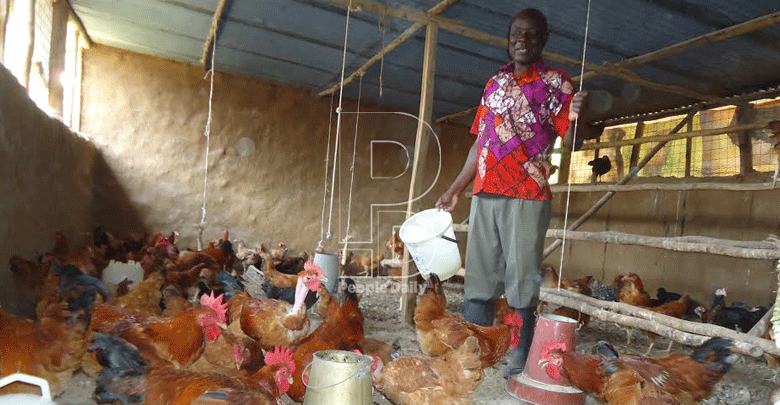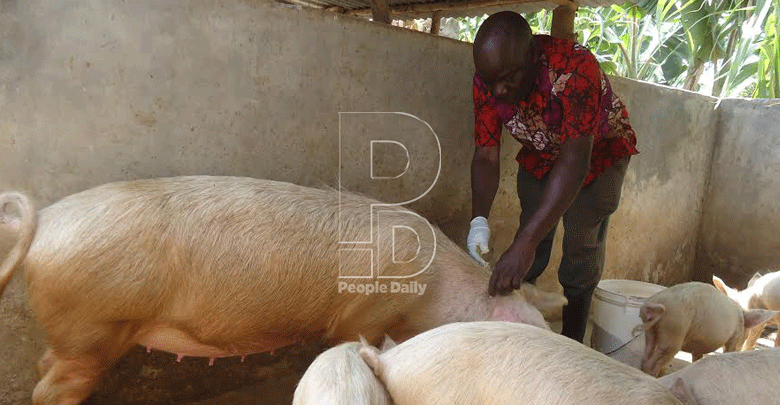Legislator takes shot at mixed farming to boost food security

A dusty murram road stretching off the Bondo-Usenge highway leads to Maurice Aringo’s farm in the outskirts of Bondo town.
Aringo, now the Member of County Assembly (MCA) for West Sakwa, Siaya county has perfected the art of practising mixed farming.
Juggling between his country assembly duties and farming activities, the ward representative has joined the league of potential farmers scaling up food productivity in Nyanza region.
“I went into farming about 10 years ago starting with two local breed goats that cost me Sh3,000 before eventually upgrading the stock,” says Aringo.
His half-acre farm is subdivided into different components hosting poultry, pigs and the dairy animals.
Formerly a long serving chief for Bondo township location, Aringo, who is widely known as Chief Abudi landed the idea of farming in the late 1990s driven by aspirations to lead the frontier in promoting food security for residents.
To keep his dream alive, he added 24 dairy goats to his stock from the venture proceeds and the number multiplied progressively. Currently, his farm has over 200 cross breed and pure breed dairy goats.
From dairy goats, he earns averagely Sh250,000 a year. A mature goat goes for about Sh4,000.
The goats also produce milk, which is supplied locally. Encouraged by sweet returns, Aringo diversified to chicken rewaring in the year 2000 starting with two local chicken breeds.

He later upgraded to improved breeds, which saw him start own hatchery.
To this end, the farmer has about 500 birds in their various stages of growth. The venture too rakes him good fortunes and on a good month he can take home an average of Sh100,000.
“Farming is a strategy that requires utmost commitment and perseverance to realise success,” he reveals.
Commitment and perseverence
His day starts at 5am to plan on the farm’s work before embarking on his legislative and oversight roles “You cannot practice farming on phone.
You must be present physically to supervise everything,” says the farmer.
In 2010, he introduced pigs in anticipation of more income and currently, he has 60 pigs. He sells the swines at various stages ranging from four months old to mature pigs.
His farm also sells breeding piggery stock to other farmers who are starting to rear the swines.
Maureen Akinyi, the farm manager says proper feeding and hygiene have been given utmost attention for better yields.
The birds are put on proper and correct mode of feeding and adequate water.
She points out that any sign of disease outbreak among the birds must be handled cautiously and promptly.
“We have managed to contain common diseases through timely vaccination and proper hygiene,” says the manager.
She says the birds are fed once a day, which takes them through to the next day. They are given mixed feeds to boost growth and production.
“Quality feeds to minimise disease infections. They are vaccinated up to the fourth month of growth,” she says.
For healthy and fast growth, the pigs are also religiously put on a proper feeding timetable.
The quantity and type of feeds given to the stock varies depending on the size.
As a routine, the stock is fed twice a day, morning and evening on mixture of feeds. Plenty of water is also availed for the pigs as part of the feeding programme.
The piglets are preferably given sower and weaners, Akinyi says, until the age of growers when they are introduced to hard feeds.
Proper feeding
On average, a piglet takes about eight months to mature. “We prefer feeding the pigs with commercial feeds, which are rationed in terms of nutrients. This makes it easy to keep them from external disease attacks,” explains Akinyi.
The farm sells pigs when they attain prime weight of 50 to 70 kilogrammes. A mature pig retails at between Sh50,000 and Sh60,000.
The farm has employed four farm assistants attached to the various components; dairy animals, poultry and piggery units.
Aringo notes that the swines have good returns if properly kept, but stresses the need for close monitoring.
For sustainable sale, his farm has established a broad market network where he readily supplies mature pigs.
For Aringo, diversification in farming comes in handy with lucrative gains. For instance, he says the various farming components supplement each other hence the stability of the agribusiness is guaranteed.
“With this kind of farming, money circulates in the projects. But you must keep proper records on the income from every segment,” he states.
He roots for unity among local farmers, saying this will help command the market niche and protect them against harassment by middlemen.
He also urges the farmers to form cooperative societies where they can pool together their resources and products. “They should work hard to increase production thus reduce capital flight, especially for poultry and dairy products,” says the MCA.
Despite his notable success, the farmer points at a few challenges such as hiked commercial feed prices, diseases and predators that attack the domesticated animals.












